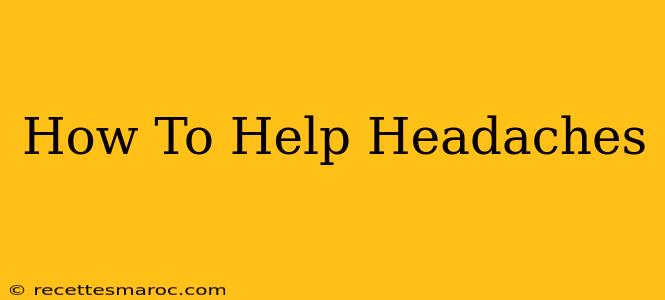Headaches. That throbbing, pounding, or even stabbing pain that can disrupt your day and leave you feeling miserable. They're a common ailment, affecting almost everyone at some point. But understanding the different types of headaches and employing effective strategies for relief can make a significant difference in your quality of life. This comprehensive guide will explore various methods to help manage and alleviate headache pain.
Understanding Your Headache: Types and Triggers
Before diving into solutions, it's crucial to identify the type of headache you're experiencing. This will help you pinpoint potential triggers and choose the most appropriate treatment. Common headache types include:
1. Tension Headaches: The Most Common Culprit
Tension headaches are characterized by mild to moderate pain, often described as a tight band or pressure around your head. They can be triggered by stress, poor posture, dehydration, or lack of sleep.
2. Migraines: Intense and Debilitating
Migraines are more severe than tension headaches, often accompanied by throbbing pain, usually on one side of the head. They can also be associated with nausea, vomiting, and extreme sensitivity to light and sound (photophobia and phonophobia). Triggers can vary widely, including certain foods, stress, hormonal changes, and weather patterns.
3. Cluster Headaches: Severe and Cyclical
Cluster headaches are excruciatingly painful, occurring in clusters or series over a period of time, followed by periods of remission. They are often accompanied by tearing, nasal congestion, and a drooping eyelid on the affected side.
Effective Strategies for Headache Relief
Once you've identified the type of headache, you can explore various relief strategies. These can be categorized as:
1. Over-the-Counter (OTC) Medications
Many readily available medications can provide relief from headache pain. Acetaminophen (Tylenol) and ibuprofen (Advil, Motrin) are commonly used for tension headaches and mild migraines. Naprosyn can also be effective for migraines and other types of headaches. Always follow the recommended dosage instructions on the label.
2. Lifestyle Changes: Prevention is Key
Making certain lifestyle adjustments can significantly reduce the frequency and severity of headaches. These include:
- Managing Stress: Practice stress-reducing techniques like yoga, meditation, or deep breathing exercises.
- Improving Sleep: Aim for 7-8 hours of quality sleep per night. Establish a regular sleep schedule.
- Staying Hydrated: Drink plenty of water throughout the day. Dehydration can trigger headaches.
- Maintaining a Healthy Diet: Limit processed foods, caffeine, and alcohol, as these can contribute to headaches.
- Regular Exercise: Physical activity can help reduce stress and improve overall health, potentially lessening headache frequency.
- Ergonomic Practices: Ensure proper posture while working at a computer or driving.
3. Home Remedies: Natural Relief Options
Several home remedies can provide soothing relief from headache pain:
- Applying a Cold or Warm Compress: A cool compress can help reduce inflammation, while a warm compress can relax tense muscles.
- Gentle Massage: Massaging your temples or neck can ease tension.
- Essential Oils: Some people find relief using essential oils like lavender or peppermint, diluted and applied topically. Always test a small area first for allergic reactions.
- Dark, Quiet Room: Resting in a dark, quiet room can help reduce sensitivity to light and sound, especially beneficial during migraines.
4. When to Seek Medical Attention
While many headaches can be managed at home, it's essential to seek medical attention if:
- You experience sudden, severe headaches, especially accompanied by fever, stiff neck, vision changes, or numbness/tingling.
- Your headaches become increasingly frequent or severe.
- Over-the-counter pain relievers are ineffective.
- You suspect a specific trigger, but are unsure how to avoid it.
Conclusion: Finding Your Headache Solution
Finding the best way to manage your headaches involves understanding your specific type of headache and its triggers. By combining over-the-counter medications, lifestyle changes, and home remedies, you can significantly reduce the impact of headaches on your daily life. Remember that prevention plays a crucial role, and seeking professional medical advice when needed is paramount for effective and safe headache management. Don't hesitate to consult your doctor or a healthcare professional to discuss your concerns and develop a personalized treatment plan.

